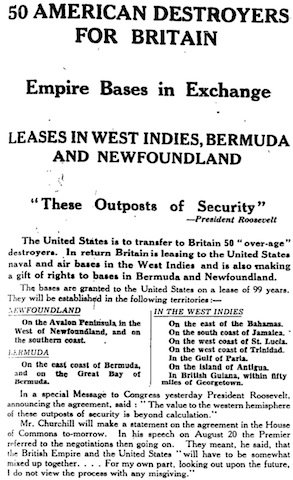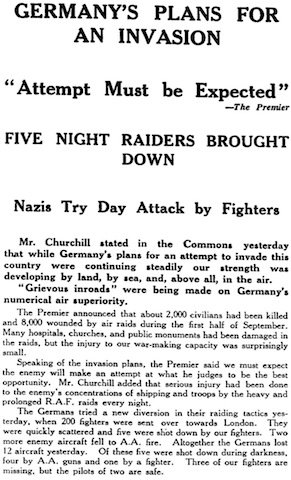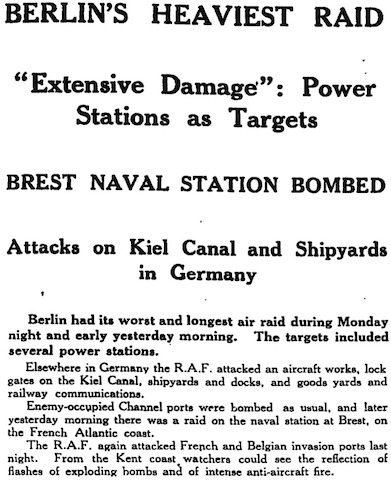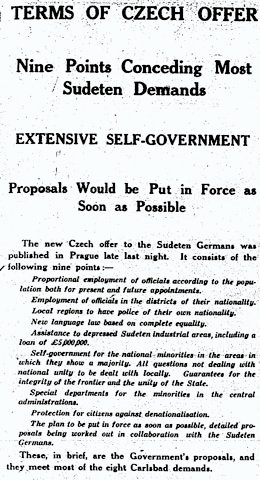
The big news in the Manchester Guardian today (5) has nothing to do with the air war but a deal with the United States, which will transfer fifty elderly destroyers to Britain in exchange for 99-year leases on bases in the Western Hemisphere. (It seems that Roosevelt meant what he said at Newfound Gap.) The destroyers 'will be used for convoy, anti-submarine work, and policing the ocean lines of communication so vital to maintaining British exports and imports'. The agreement should be regarded as 'a proof of a solidarity which will remain unaffected by the attacks of isolationists or the slow poison of Nazi propagandists'.
The Luftwaffe continued its aerial campaign yesterday. Two 'strong forces of bombers and escorting fighters, estimated at 250 aircraft in each case [...] attempted to force their way up the Thames estuary'. The attacks were warded off by fighters and anti-aircraft guns and bombs fell on only one or two places in Kent and Essex, causing 'negligible' damage. The same is true of the previous night's raids: they are described as 'widespread over many parts of this country, but reports indicate that the general damage was slight' (2). The only reported fatalities are a man and a baby, killed when their shelter took a direct hit. Last night's raids followed much the same pattern (5); no casualty figures are reported.
That bombing casualties so far have been surprisingly low is reinforced by an article written by a Guardian special correspondent. He or she reports from a northern industrial town on the aftermath of a recent night raid. Fifteen bombs fell, damaging stables, a colliery and a factory as well as working-class houses. The latter are now heavily damaged, where they aren't simply 'pathetic groups of rubble'. Some two hundred people lived in them, yet few were injured and only one man was killed -- and he was sleeping in one of the stables.
Either they were secure below their stairs or chiefly in the surface brick-built shelters. Not one of these was damaged, and the staircases were left standing, mostly under considerable weights of brickwork.
Those made homeless have coped well. Some have been housed temporarily in the 'emergency shelter of a neighbouring church schoolroom' while others have managed to find new homes for themselves. Many have returned to their former homes, though only for a visit:
"This was my house. May I go in and look for things?" This I heard an elderly woman ask quite calmly of a police officer. "If there's anything to be saved go in and get it, hinney," he answered kindly [...]
One response to the sight of the ruined houses was that 'The lunatic ought to be poisoned' -- meaning Hitler.
According to the London correspondent, yesterday morning's 'air attack' (presumably meaning an alert, as no such raid is otherwise reported) made 'everybody' recall the very 'first air-raid warning of exactly a year ago, which came on London within half an hour of Mr. Chamberlain's announcement that we were at war'.
On that morning we remembered everything we had been told about the thousands of 'planes that would darken the sky and the tens of thousands of dead who would be left among the ruins. Many people felt nervous that day who have never felt nervous since.
It's very different now: 'London has ceased to count its alarms or to be alarmed by them'. The streets did empty somewhat, but anyone with business to attend went on attending to it. 'People went on feeding the pigeons in Trafalgar Square [and] newspaper sellers stood unmoved beside their cheerful announcements of R.A.F. successes in Germany'. One of their placards summed up the 'state of the game' as 'Hitler Napoo Finee; John Bull Going Strong'.
![]() This work is licensed under a Creative Commons Attribution-NonCommercial-NoDerivatives 4.0 International License.
Permissions beyond the scope of this license may be available at http://airminded.org/copyright/.
This work is licensed under a Creative Commons Attribution-NonCommercial-NoDerivatives 4.0 International License.
Permissions beyond the scope of this license may be available at http://airminded.org/copyright/.





Pingback:
Airminded · Sunday, 8 September 1940
Pingback:
Airminded · Sunday, 22 September 1940